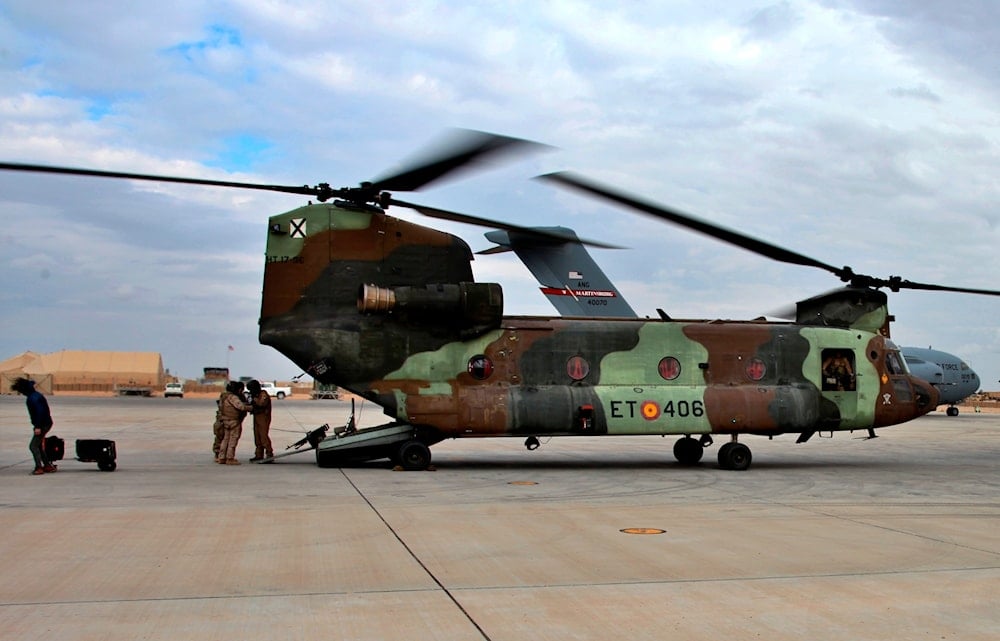Iraq to end int'l coalition mission by September, PM's advisor says
The Iraqi government announces the end of the US-led coalition mission by September 2025, transitioning to bilateral defense ties and full withdrawal by 2026.
-

In this Jan. 13, 2020, file photo, a US Air Force plane, background, lands at Ain al-Asad air base, in Anbar, Iraq (AP)
The Iraqi government announced on Sunday that the US-led international coalition’s mission in Iraq will officially end in September 2025, according to Prime Minister Mohammed Shia’ al-Sudani’s advisor, Hussein Allawi, as reported by the state-run Iraqi News Agency (INA).
Allawi confirmed that the coalition’s presence at its Baghdad headquarters and Ain al-Asad airbase will end in September under an agreement between Iraq and coalition members, in line with the government’s plan to bolster Iraq’s armed forces and transition to bilateral defense partnerships.
“The Iraqi government is committed to its program of building the armed forces and ending the coalition’s mission, while transitioning relations with coalition countries into stable bilateral defense arrangements guided by political, economic, and cultural ties,” the advisor told INA.
Full withdrawal by September 2026
The prime minister's advisor outlined a two-stage timeline agreed upon by Iraq and the coalition, with the initial withdrawal phase scheduled for September 2025 and the full completion targeted by September 2026. He noted that Iraq plans to continue advisory and capacity-building partnerships with international allies beyond that period.
Allawi explained that this approach demonstrates the government's commitment to establishing long-term partnerships across all sectors, particularly in security, while acknowledging the ongoing efforts of the joint military committee tasked with coordinating discussions regarding the coalition's mission.
The advisor emphasized that the phased withdrawal reflects Iraq's strategic shift toward normalized relations with the US and coalition nations, moving from multilateral military structures to bilateral security agreements. “It will return Iraqi-American and Iraq-coalition ties to the kind of strategic framework agreements that existed before the fall of Mosul to ISIS in 2014,” he told INA.
An end to a decade of foreign interference
In 2014, ISIS captured Mosul and large portions of Iraqi territory, prompting Baghdad to seek international assistance. The US rapidly mobilized a coalition of more than 80 nations under Operation Inherent Resolve, aiming to provide military support through targeted airstrikes, specialized training programs, and comprehensive logistical assistance for Iraqi security forces.
Though Nouri al-Maliki had requested US and UN assistance, the coalition's operations proceeded without a new UN mandate, prompting legal debates and fueling Iraqi perceptions of the mission as an extension of American occupation rather than legitimate counterterrorism.
The coalition was the center of much controversy; coalition airstrikes that aimed to help the recapture of cities like Mosul also caused many civilian casualties, reaching thousands, according to NGOs like Amnesty International. Critics have argued that the coalition underreported such casualties.
Bombing campaigns devastated infrastructure, leveling Mosul's Old City and fueling criticism that anti-ISIS operations sometimes punished civilians collectively.
Despite Iraq's December 2017 declaration of victory over ISIS, coalition forces maintained an advisory and counterterrorism presence that became increasingly controversial within Iraqi politics.
In 2021, Washington and Baghdad reached an agreement to transition the US military role from combat operations to training and advisory missions, though thousands of coalition troops continued to be deployed across Iraqi bases.

 3 Min Read
3 Min Read










